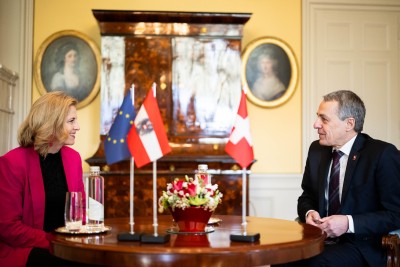“In times of geopolitical crises, exchanges between neighbors are particularly valuable,” explained Foreign Minister Meinl-Reisinger on her arrival in Bern. “Switzerland is an indispensable partner for Austria – both at an economic and security policy level and because of the close human ties.”
Cooperation between the two neighboring countries covers a broad spectrum: economically, Switzerland is one of Austria’s most important trading partners and one of the most important foreign investors in the Alpine republic. Around 67,000 Austrians living abroad currently live in Switzerland – the second largest Austrian expat community in the world after Germany. In addition, around 9,000 cross-border commuters commute between the two countries every day.
Switzerland and Austria are neutral states. During their talks, Federal Councillor Ignazio Cassis and Foreign Minister Beate Meinl-Reisinger discussed the topic of neutrality in the current context, and, in addition to economic issues, security policy was a particular focus of the discussion. “Only cooperation and solidarity create security – in the neighborhood, at European and international level,” emphasized Meinl-Reisinger. Existing cooperation already includes civil protection measures, joint cyber defense projects, and cooperation in the protection of European airspace (Sky Shield).
Federal Councillor Cassis also highlighted the importance of Swiss neutrality and emphasized his country’s intention to continue to actively promote peace and security in Europe in the future. In particular, he referred to Switzerland’s upcoming chairmanship of the Organization for Security and Co-operation in Europe (OSCE) in 2026: “We want to work to ensure that the OSCE retains its role as an inclusive platform for dialog for all states parties and remains capable of acting.”
European political relations were also on the agenda. Mr Cassis expressly thanked Austria for its support during the recent negotiations between Switzerland and the European Union. He particularly highlighted Switzerland’s participation in European programs such as Horizon Europe, which represents a significant step towards more intensive cooperation.
In the multilateral field, Austria and Switzerland are united by their joint support for international organizations such as the OSCE, the Council of Europe and the United Nations. Current international trouble spots – including the war in Ukraine, the Middle East conflict and the fragile situation in the Western Balkans – were discussed in detail by both foreign ministers. Both countries emphasized the importance of a rules-based international order and the commitment to peace and stability in these regions.
In conclusion, Foreign Minister Meinl-Reisinger drew a positive conclusion to the meeting: “Our dialog underlines the importance of a close partnership based on trust, especially in difficult times. Together we can overcome many challenges better.” Both ministers agreed to further intensify and regularly continue the exchange in the future.
